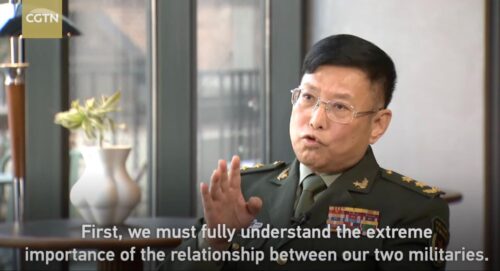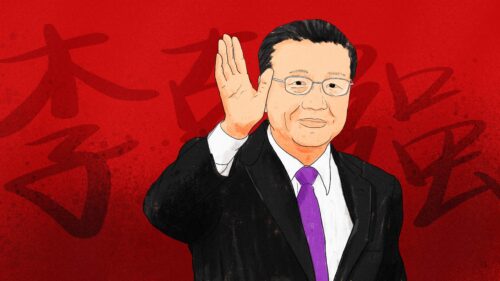Thailand’s confusing election was a win for China
...and is China running the UN? | September 6, 2023
| Dear reader:
Gloom is the mood of the conventional wisdom about China in the Anglophone press. But from Beijing’s point of view there is a lot to be happy about right now, in global politics if not economics. Today we highlight two developments that probably make Xí Jìnpíng 习近平 sleep a little better: The pro-China bent of Thailand’s new government formed by a party that lost the popular vote, and China’s success in bending the United Nations to its will when it comes to Taiwan. Our Word of the Day is Thailand’s Pheu Thai Party, literally “For Thai Party” (为泰党 wèi tài dǎng). |
 |
Jeremy Goldkorn Editor-in-Chief |
CHINA AND SOUTHEAST ASIA
Thailand’s confusing election was a win for China |
 Candidates Pita Limjaroenrat of the Move Forward Party and Srettha Thavisin of the Pheu Thai Party. Illustration for The China Project by Alex Santafé. Candidates Pita Limjaroenrat of the Move Forward Party and Srettha Thavisin of the Pheu Thai Party. Illustration for The China Project by Alex Santafé. |
|
The Pheu Thai Party lost the popular vote in Thailand’s May elections, but it is now running the country under the leadership of Prime Minister Srettha Thavisin.
Some critics argue that Thailand has become over reliant on China.
The Pheu Thai-led government will likely maintain a close relationship with Beijing on various issues, including Myanmar, which may not align with the interests of the United States, reports Jitsiree Thongnoi from Bangkok.
|
NEWS BRIEFING
| Here’s what else you need to know about China today:
China has banned officials at central government agencies from using Apple’s iPhones and other foreign-branded devices for work or bringing them into the office, the Wall Street Journal reported today, citing people familiar with the matter. Chinese Premier Lǐ Qiáng 李强 urged against a “new Cold War” and for countries to “appropriately handle differences and disputes” at the Association of Southeast Asian Nations (ASEAN) leaders’ summit, which began in Jakarta, Indonesia yesterday. It comes just a week after a number of ASEAN members launched strong protests against China’s new official map, which lays claim to most of the disputed South China Sea. Neither Xí Jìnpíng 习近平 nor his U.S. counterpart Joe Biden are in attendance. But Li, Xi’s second-in-command, did briefly speak with Japanese Prime Minister Fumio Kishida today on the sidelines of the summit for their first in-person meeting since Li took up his current role in March. They spoke about Tokyo’s recent decision to begin releasing treated wastewater from the wrecked Fukushima nuclear power plant, which has ignited fierce backlash from Beijing, as well as a rise in anti-Japanese sentiment in China. More than 36,000 people have been evacuated in Fuzhou, the capital of east Fujian Province, while classes, trains, and buses have been suspended due to torrential rain brought on by Typhoon Haikui, Chinese state media reported today. The direct economic loss is estimated to be over 552 million yuan ($76.7 million). Calls for the British Museum to return Chinese artifacts are growing on Douyin, China’s version of TikTok. A short-video series (available on YouTube, Douyin), titled “Escape from the British Museum,” has gone viral on the social media platform for its tale of a jade teapot, played by a woman, looking to return to China. Chinese state broadcaster CCTV has since reposted the series, heralding it for being “based in reality” and stating that “we hope that Chinese cultural relics lost overseas will come home as soon as possible.” The British Museum, which holds the largest collection of Chinese antiquities in the West, has come under mounting pressure from people from China and other parts of the world to return cultural relics after it reported that 2,000 treasures were “missing, stolen, or damaged” last month. China is considering cracking down on people wearing offensive clothing, after the nation’s Standing Committee released a recent draft of legal revisions that would allow for fines of up to 5,000 yuan ($680) and even up to 15 days in jail for those who engage in behavior that is “detrimental to the spirit of the Chinese people and hurt the feelings of the Chinese people.” Some Chinese social media users have expressed concern that the revisions would go too far. Chinese listed companies’ profits slumped in the second quarter: The 5,000-plus firms trading on the Shanghai and Shenzhen stock exchanges posted an average 9.6% year-on-year decline in profit for the three months ending in June. Two people have been arrested for making a hole in the Great Wall: The two used an excavator to dig through the Wall in an apparent attempt to create a shortcut for construction work. Chinese state media: The top headline of the Xinhua News Agency’s Chinese website today is “Grasp the pulse of the digital era and create a happy future together.” It’s a story about a congratulatory letter from Xi Jinping to the 2023 China International Smart Industry Expo about the “direction for the development of the digital economy.” The message: China will innovate, develop cutting edge tech, and integrate the digital economy with the real economy. The People’s Daily today highlights yesterday’s meeting in Beijing between Xi Jinping and the president of the International Committee of the Red Cross, Mirjana Spoljaric Egger; Xi sending a congratulatory letter to the 10th Meeting of Ministers of Justice of the Shanghai Cooperation member states; and Premier Li Qiang’s attendance of the ASEAN leaders’ summit in Jakarta.
|
TAIWAN AND CHINA AT THE UN
‘Is China running the UN?’ |
 Delegates from the People’s Republic of China enjoyed the welcome to their new seats at the United Nations on November 15, 1971. Image from China Daily. |
|
The 78th session of the United Nations (UN) General Assembly convened yesterday.
The WHO and WHA have emerged as key battlegrounds for China’s suppression of Taiwan at the United Nations.
“Is China running the UN?” asked a French journalist at a UN press conference earlier this year. The answer is no — but Beijing is dictating the UN’s Taiwan policy, argues Chris Horton from Taipei. And he has the faxes to prove it.
|
SOCIETY AND CULTURE
How a Taiwanese singer’s concerts became a ‘queer party’ in China |
 Jolin Tsai performs during a concert of her Ugly Beauty World Tour held at Kaohsiung Arena, Kaohsiung city, Taiwan, November 22, 2020. |
|
Jolin Tsai’s recent concert in Shenzhen was filled with queer visuals, including rainbow flags and banners. The Mandopop icon, whose Chinese name is Cài Yīlín 蔡依林, has consistently given representation to LGBTQ people in her concerts and promotions.
The inconsistency of China’s restrictions on the LGBTQ community, which differ from city to city, and the resilience of queer voices in an increasingly hostile political environment, can be seen in the prominence of rainbow symbols in Tsai’s Shenzhen concert, reports Forrest Song in the latest installment of Queer China. |
MORE FROM THE CHINA PROJECT
|
FROM THE NEWSBASE
Below are links from our NewsBase to other noteworthy reports published in the last 24 hours from and about China.BUSINESS AND TECHNOLOGY:Gaming industry Economic gloom or boom iPhone banned for Chinese government workers Electric vehicles Durian sales AI China’s luxury market Huawei Alibaba SCIENCE, HEALTH, AND ENVIRONMENT:China’s growing obesity population China’s shipbuilders are going green POLITICS AND FOREIGN AFFAIRS:The Party is above science G20 and Xi’s no-show ASEAN Japan Indonesia Saudi Arabia Vietnam Russian gas Hong Kong man in custody after ‘seditious’ kids books SOCIETY AND CULTURE:Hong Kong’s infrastructure Great Wall damaged Catholicism Burnout for China’s youth Vocational teachers
|
</table





